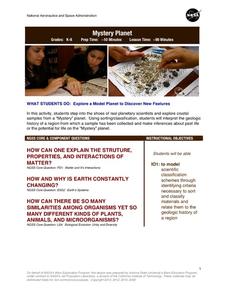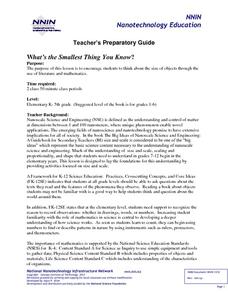C.S. Lewis Foundation
Study Guide to The Abolition of Man
A first-rate resource that tackles the complexity of C.S. Lewis’s The Abolition of Man. It provides a clear plan for analysis, discussion, and exploration. The two sets of questions focus readers to concentrate on the text itself, or to...
Shakespeare Uncovered
Women’s Roles in As You Like It
“There is nothing that becommeth a maid better than soberness, silence, shamefastness, and chastity, both of body & mind.” This line, from Thomas Bentley ‘s The Monument of Matrons published in 1582, typifies the way women were...
Texas State Energy Conservation Office
Investigation: Blowing in the Wind
Using a simulated air sample, environmental or earth science pupils examine the components. You will need to prepare the faux air by using a hole punch and various colors of construction paper. Each color will represent a different...
Cornell University
Bacteria Take Over and Down
Bacteria outnumber all other forms of life on Earth. Scholars observe the growth of bacteria in petri dishes to understand their role in maintaining good health. Then, they observe the growth of bacteria after they introduce...
NASA
Mystery Planet
What can one learn about a planet based on a small surface sample? Learners will explore artifacts from a mystery planet and see what they can determine about the planet based on the evidence in front of them.
Curated OER
Water in the Biosphere
Environmental explorers examine the campus and take note of living organisms. Introduce them to the biosphere and the questions of the day: How much water can be found in the biosphere? A slide show helps you along, and even contains a...
NASA
Is It Alive?
Determining whether or not something is living can be more difficult than it seems. Put your young scientists to work defining their own criteria to identify life, then work with three samples to see if they are alive or not.
Calvin Crest Outdoor School
Survival
Equip young campers with important survival knowledge with a set of engaging lessons. Teammates work together to complete three outdoor activities, which include building a shelter, starting a campfire, and finding directions in the...
Curated OER
Constructing Narrative from the Migrant Experience in Literature
Excerpts from John Steinbeck's The Grapes of Wrath and from John Fante's Ask the Dust, as well as a variety of primary source documents provide the background for an examination of the migrant experience from 1920-1945.
Curated OER
Disguise for the Eyes
Young scientists discover how many, many animals use color as a way of helping them to survive in the wild. They understand how animals use color in their everyday lives. Pupils engage in hands-on activities, watch videos, access...
Curated OER
Feature Story/Interview Lesson Plan
Young journalists get a chance to practice their story writing skills by listening to an interview. Using the provided script, a class member interviews a treasure hunter (the instructor) while classmates take notes and then compose a...
Georgia Department of Education
Exploring Poetry and Poets
Combine the study of poetry and non-fiction texts with this complete and ready-to-use six-week unit. After reading numerous poems from local writers and compiling a personal anthology, high schoolers find and read a memoir or biography...
Humanities Texas
Primary Source Worksheet: Theodore Roosevelt, Excerpt from Eighth Annual Message to Congress
As Theodore Roosevelt reminded Congress in 1908, corporation one is not corporation two. Readers of this excerpt from Roosevelt's Message to Congress have an opportunity to sharpen their comprehension skills as they study this primary...
Close Up Foundation
Teach the Vote
Why is voting important? A social studies unit presents a non-partisan approach to the importance of voting, to voting laws and procedures, and to resources that voters need to become informed voters.
Agriculture in the Classroom
A Rafter of Turkeys
How did that turkey get from the early Aztec culture to your table? Learn about the history of wild and domesticated turkeys in North America, as well as their inclusion in Thanksgiving traditions, with a two-part agricultural science...
What So Proudly We Hail
A Lesson on Benjamin Franklin’s “Project for Moral Perfection”
Benjamin Franklin identified 13 virtues that he felt would strengthen his character if he could focus on each one. A thorough lesson explores high schoolers' personal values in the context of their lives, and compels them to strive for...
Maryland Department of Education
A Raisin in the Sun and Dreams Deferred
To conclude a study of A Raisin in the Sun and to prepare for a visit to the Lewis Museum, class members analyze Langston Hughes' poem "Harlem." Learners then draw connections to characters in the play and to their own experiences by...
Foreign Policy Association
Public Diplomacy Online Lesson Plan
To build an understanding that there are many perspectives of global issues and that an individual's perspective is influenced by background and experience, class members assume the identity of a person in the global community and...
Curated OER
Lesson New Museum: Exploring the Building
Explore the possibilities of buildings, public spaces, and architectural design. Learners examine the work of SANAA architects Sejima & Nishizawa through background information, images, and guided class discussion. This lesson...
Curated OER
Lesson: Urs Fischer: Reviving the Past Art Movements
Seven major abstract art movements are analyzed by learners in groups. Each group analyzes various works by determining which work belongs to which movement. They then read Flatland, engage in an art and literary analysis discussion,...
PBS
Talking to Myself: Hamlet’s Soliloquies
If you’re a first time teacher of Hamlet—or any Shakespeare play, this resource will help keep your head above water. Included are copies of Hamlet’s soliloquies, worksheets for student work, and high-quality videos that demonstrate to...
PBS
Supernatural Shakespeare and Macbeth
"A drum, a drum! Macbeth doth come." The withered and wild witches of Shakespeare’s Scottish play launch an examination of the fantastical elements in Act I, scene iii, paying particular attention to the action, imagery,...
National Nanotechnology Infrastructure Network
What’s the Smallest Thing You Know?
Elementary learners listen to a story, then sort objects from largest to smallest at six different stations around the classroom. Adaptable for a large range of age and ability groups.
Montana Natural History Center
Studying Grassland Ecosystems
At first glance, grassland ecosystems might seem dull and uninteresting, but once you start to explore it's amazing the things you'll find! Through this series of engaging lessons, activities, and experiments, elementary students examine...
Other popular searches
- Three States of Matter
- Changing States of Matter
- 3 States of Matter
- States of Matter Gases
- Science States of Matter
- Chemistry States of Matter
- States of Matter Lab
- 6 States of Matter
- States of Matter Plasma
- Identifying States of Matter
- Changes in States of Matter
- Matter Changing States

























